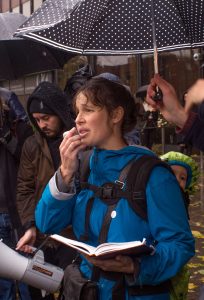Faith groups commit to resistance in the wake of Pittsburgh synagogue shooting.
Montrealers of diverse backgrounds rallied with the Jewish community at memorial vigils across the city following a mass shooting that took place on Saturday, Oct. 27 and killed 11 people on at the Tree of Life synagogue in Pittsburgh.
The suspected gunman, Robert Bowers, is said to have shouted “all Jews must die” before opening fire on the congregation of worshippers observing Sabbath services. The Anti-Defamation League called it the “deadliest attack on the Jewish community in the history of the United States.”

The following day, around 100 people gathered outside the Montreal Holocaust Museum for one of the city’s first memorial vigils. Mourners huddled under umbrellas as a mix of snow and rain fell on them. The scene was supervised by six police cruisers.
“I think it’s important to have a big gathering like this, to show that a lot of people are ready to come out in weather like this,” said Sam Hersh from the student group Independent Jewish Voices McGill. “To show we won’t stand for attacks like this on the Jewish Community, or any other community.”
Speakers at the vigil drew connections to the January 2017 shooting at a Quebec City mosque that left six worshippers dead, pointing out that a rise in anti-Semitism has paralleled a rise of Islamophobia and bigotry against other marginalized groups in society.

“They’re all due to the rise of right-wing populism,” said Hersh. “We’ve beat these forces before, we can do it again.”
Samer Majzoub, president of the Canadian Muslim Forum, a civil-rights organization, spoke forcefully against all kinds of religious bigotry and racism. “Again, people were shot for the simple reason of their faith,” he said. “We are all targeted, and this has to stop.”
As the rain poured heavier, Rachel Kronick, founder of the Mile End Chavurah, a progressive Jewish study and worship group, delivered a prayer called the Mourner’s Kaddish, traditionally recited to remember the deceased.
“It is a prayer that declares there is a source beyond us,” said Kronick. “That there is a great mystery that transcends hate, and transcends this world.”
On Monday, close to 1,000 people gathered at the synagogue of Beth Israel Beth Aaron, an orthodox Jewish congregation in Côte Saint-Luc. With a standing room completely filled, the crowd inside spilled out onto the steps of the synagogue and into the cold night air. People huddled in groups and watched the proceedings on a livestream.
For David Ouellette, director of research and public affairs at the Centre for Israel and Jewish Affairs (CIJA) Quebec, the turnout sent a strong message.
“It reinforces something we know,” said Ouellette. “The vast majority of Quebecers utterly reject anti-Semitism and recognize the Jewish community for the many contributions it has made to Quebec.”
On Tuesday night, vigils were held on both McGill and Concordia campuses, organized by Muslim and Jewish student groups from both schools, alongside their respective multi-faith centres.
Rev. Ellie Hummel, chaplain and coordinator at Concordia’s Multi-faith and Spirituality Centre, said she
felt a numbness when she first heard about the attack in Pittsburgh, but it was ultimately replaced with determination.

“It just gives me more resolve to do the work,” said Hummel. “We all ask the same questions. What can we do in the face of violence and hatred? What can I do to make the world a better place? That’s a question I bring everyday to my work.”
Perri Wiatrak from Am McGill, a Jewish student group dedicated to inclusivity and egalitarianism, said that the geographic proximity was particularly jarring to her.
“I know some people who had connections to the victims,” said Wiatrak. “I felt that in a way that was much stronger. This will impact the way I see any future incidents that I pray won’t happen.”
For students wondering what they can do to resist anti-Semitism and other forms of bigotry, Wiatrak said that hearing marginalized groups and showing up for them is a good place to start.

“The first course of action is, all of your friends from marginalized communities need to know that you are there and you are listening to them, and you care about their perspective,” said Wiatrak.
Photos by Kenneth Gibson.




